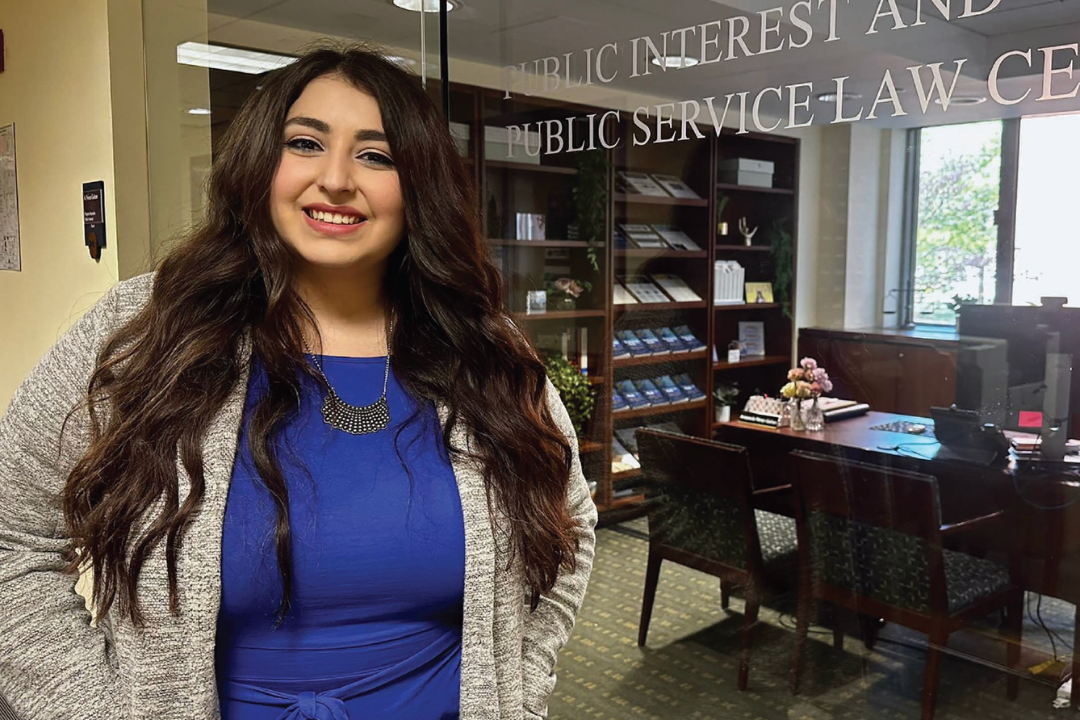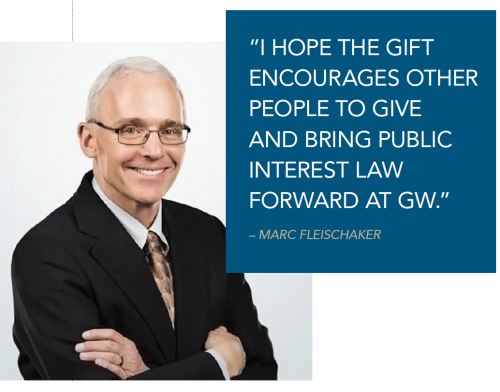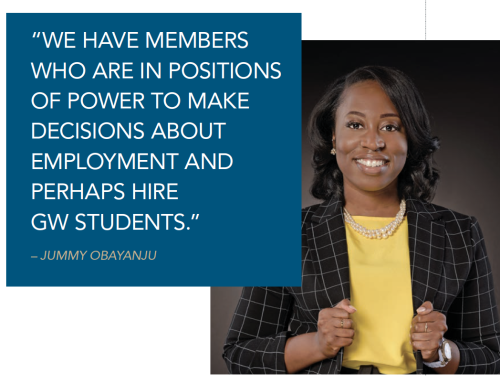By Mary Dempsey
IN THE MIDDLE OF GW LAW’S Stuart Hall, Room 104A—a glass-walled office with a cascade of plants on its windowsills and a colorful backdrop of artwork—has become the brick-and-mortar emblem of the school’s exciting growth in its Public Interest and Public Service Law program.
It is also a sign of Dean Dayna Bowen Matthew’s ongoing responsiveness to input from students and alumni.
GW Law’s new strategic plan calls for substantially augmenting the Public Interest and Public Service Law program, and no time has been wasted in pushing that goal forward. The program has unveiled a new alumni advisory council, increased summer stipends for students, hired a new public interest associate, and launched the Richey Fellows program to bring public interest lawyers to the school to connect with students. Even GW Law’s highly regarded public interest pre-orientation program, unique in the nation, is getting extra energy.
One of the most exciting new resources inside Room 104A is the new Fleischaker Family Public Interest and Public Service Program Coordinator Anapaula Pérez-Gaitan. A $525,000 gift from Marc Fleischaker, JD ’71, and his wife, Phyllis, enabled Pérez-Gaitan’s position and is providing kickstart support for other components of the program. The dynamic new administrator serves as a lynchpin for the program’s recasting. She is upgrading the program’s website pages, fielding student inquiries about summer stipends, posting news about the program to social media, checking the online calendar she created for students to book mentoring time with alumni, and identifying other ways she can help support the multi-pronged buildup of the program. She will also be assisting the new Richey Fellows and helping with the annual pre-orientation program for students interested in public interest and public service law.
“The importance of the office is that students now have a dedicated space to come and see Anapaula,” says Alan Morrison, the Lerner Family Associate Dean for Public Interest and Public Service Law. “She’ll have office hours and she can talk to them about how to get fellowships or summer jobs. It’s both a physical space and a concrete symbol of the law school’s expanding focus on public interest and public service.”
Morrison says the program previously lacked the bandwidth to manage social media and be as active with the Career Center and other parts of the Law School as it wished. The Fleischakers’ generous gift, he says, is making a transformational difference.
“I hope the gift encourages other people to give and bring public interest law forward at GW,” says Fleischaker, chair emeritus of ArentFox Schiff, the firm he joined—and remained with—after graduating from GW Law.
Fleischaker began his career in anti-trust law but also helped develop the firm’s environmental practice and its work representing trade associations and nonprofits. He says public interest organizations have always interested him, and his volunteer service on some of their boards over the years provided him with pivotal lessons in leadership and put him into contact with dynamic people.
Seven years ago, he founded the nonprofit DC Affordable Law Firm, which brings experienced lawyers together with younger lawyers to serve clients. He toggles back and forth between the role of executive
director and that of chairman of the board.
“We represent people who make too much money to get free legal services. We represent teachers and police officers and firefighters and people who work for the government and make $40,000 a year and can’t afford lawyers,” Fleischaker says. “We started with six lawyers, all new graduates. Each year we hire five or six and we have a fellowship, so now we’re up to 17 or 18 lawyers.”
Given his interest, Fleischaker says he was pleased to be invited to join GW Law’s new Public Interest and Public Service Law Advisory Council.
“There is a genuine excitement from each of our council members to actively participate. And I was very impressed by the dean and her commitment to lawyers working in public interest law,” he says. “One thing we discussed at the first council meeting was the possibility of opening an office in the Law School where there would be a focus on public interest law, where students could get information and connect with mentors.”
Fleischaker decided to step up to make the idea a reality.
Room 104A has quickly become the pulse point where GW Law students interested in public service can access strengthened programs and services to support their quest for public interest and public service jobs.
“Our Fleischaker Family Program Coordinator Anapaula Pérez-Gaitan is off to a flying start and our students are quickly reaping rich rewards from her far-reaching work,” Matthew says. “I am incredibly grateful to Marc and Phyllis Fleischaker for their incredible generosity which is helping to propel our Public Interest and Public Service program to a whole new level.”
New Public Interest Advisory Council
Another shining example of the law school's burgeoning commitment to the program is the new Public Interest and Public Service Advisory Council (PIAC).
“It’s been almost a year and a half now since a group of students entering their third year came to me and said, ‘We think the school is not doing enough for the Public Interest Law program,’” Morrison says. “Dean Matthew immediately responded by asking the students to come in and talk to her.” The dean quickly raised the summer stipends for students who take public interest internships, which typically carry no pay. It was the first increase in the stipends in 14 years. And to ensure the program continues to receive the resources it needs now and in the future, Matthew established PIAC—GW Law’s first new alumni advisory council in a decade.
“It would be difficult to overstate the importance and impact of this new board where GW Law alumni commit their time, talent, and treasure to supporting GW’s Public Interest Law students,” Matthew says. “PIAC advises the administration on curricular and programmatic content that will best prepare public interest students for service; serves as a network to introduce students to opportunities for internships and employment; and contributes and helps raise funds to support the program’s growth by increasing public interest student scholarships, stipends, and fellowships,” she says. The advisory council’s ultimate goal, she adds, is to endow a full-fledged public interest law center at GW Law.
PIAC is chaired by Olajumoke “Jummy” Obayanju, JD ’16, and Alessandro Terenzoni, JD ’06. Obayanju directs the National Racial Equity Initiative for Social Justice with the Congressional Black Caucus Foundation. Terenzoni is deputy director of the Office for Civil Rights in the Department of Justice’s Office of Justice Programs; he has also taught at GW Law. Morrison and National Family Violence Law Center Professor of Clinical Law Joan Meier serve as the council’s faculty advisers.
The advisory council was the “brainchild” of two alumnae, Obayanju and Mike Michel, JD ’15, who wanted to strengthen support for public interest students and diversify the alumni engaged in student life. Michel is corporate counsel at Marriott International and began the work of creating the PIAC after the idea emerged during a meeting of the Association of Black Alumni.
The group had its first meeting in December 2021 when 100% of its members gathered to get right to work. Already, the advisory council members have taken steps to become directly engaged with students, including acting as mentors and reviewing the curriculum for opportunities to add new public interest law courses. The goal is to link resources across the entire law school that can help support public interest students.
Obayanju describes the council as the school’s most diverse, crossing race, ethnicity, practice areas, and other demographics.
“Many advisory councils have alumni from classes in the ’70s, ’80s, and ’90s. We have members on our council who graduated in the ’70s, and we have grads as recent as myself,” she says. “We have members who are in positions of power to make decisions about employment and perhaps hire GW students. At the same time, we have members like myself, not too far removed from university, who have fresh eyes about law school experiences and the current public interest sector.
“This council is also a way to open doors to alumni who felt excluded … because of the financial barriers to serving on a council,” Obayanju adds.
Advancing Public Interest Connections
Another important new component of the Public Interest and Public Service Law program is the Richey Fellows program, which is funded through unused monies connected to the Charles Robert Richey Equal Justice Award. The annual award recognizes judges, lawyers, civil libertarians, and human rights activists who work for equal justice.
“We got permission to use some of the money to bring in public interest lawyers in mid-career for two or three days, four times a year, to meet with students and to encourage them to do public interest work,” Morrison says. “We’re aiming for the first fellows to arrive in the fall of 2023. We’ll have two each fall and two each spring.” Morrison encourages all those wishing to apply or to nominate someone to serve as a Richey Fellow to please send their names and contact information to publicinterest law [dot] gwu [dot] edu or call 202.994.2680.
law [dot] gwu [dot] edu or call 202.994.2680.
Because public interest law students face competing financial pressures, Morrison says work is underway to identify more money to enable them to do public service work. Among her other duties, Pérez-Gaitan is
responsible for guiding students to the right resources for federal public service loan forgiveness, loan assistance through GW Law, and tuition discounts when needed.
The school also hopes more alumni will step forward with scholarship support for public interest law students.
This new attention on the program promises to have a multiplier effect, including in raising the profile of an iconic program at GW Law: the 13-year-old Public Interest Law Pre-orientation, the only initiative of its kind in the country. For three days each fall, some 100 incoming law students in the pre-orientation meet public interest practitioners and get a first-hand look at their work.
“The purpose is to introduce new 1Ls to legal Washington, DC,” says Assistant Dean for Pro Bono and Advocacy Programs David Johnson, who oversees the pre-orientation. “You can point to any law student in our building, public service or not, and one of their top three reasons for picking GW is because it’s in Washington. But if you don’t get out, out into the District, you might as well be in Kansas.”
Students in the pre-orientation are divided into small groups that visit judges, the DC mayor’s counsel, advocacy organizations, the medical examiner’s office, and DC Council members, among others. Upper-class students or public interest law staff accompany the students.
“This year, Judge Gregory Maggs at the U.S. Court of Appeals for the Armed Forces invited the entire pre-orientation to his courtroom for a visit—and he brought in two attorneys who frequently appear before him in the courtroom. One was a prosecutor, the other defense counsel,” Johnson says. “One mentioned that she’d always wanted to be a litigator but, as a lesbian, had never imagined herself joining the military. The number of questions she got from the students was off the charts.”
The program also incorporates a community service element. All of the students spend a segment of their three-day pre-orientation volunteering for Bread for the City, a DC non-profit that provides food, clothing, legal services, and other resources to low-income residents.
“They are working in a garden, packing up groceries. The 1Ls are together and laughing, making friends, and meeting like-minded people,” Johnson says. “Students tell me that they love walking down the halls at school later, knowing people in other sections. It wasn’t part of the goal of the pre-orientation, but it is a glorious byproduct.”
Another bonus: Students interested in public interest law are automatically added to the school’s pro bono listserve.
The Public Interest and Public Service Law program connects students with pro bono opportunities, encourages students to seek positions in the nonprofit and government sectors, and helps students find ways to fund their legal education so they can pursue careers outside of traditional law firms. Morrison says the overarching goal of the program is to help students understand why people choose to work in public interest law.
“I tell my students that the work is intellectually challenging. You feel good about what you’re doing. You want to go to work every day. You think you can make a difference and that there are more important things for most people than making money,” Morrison says. “And when it comes to opportunities to learn and practice public interest law, GW is probably the best in the country.”





